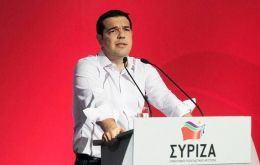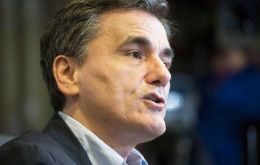MercoPress. South Atlantic News Agency
Tag: Syriza party
-
Wednesday, September 23rd 2015 - 08:43 UTC
Tsipras takes office with a daunting agenda; 45% abstained on Sunday

Alexis Tsipras took the oath of office for a second term as Greek prime minister, promising to revive the crippled economy while demanding debt relief from creditors as his “first big battle” following an unexpectedly clear election victory.
-
Wednesday, July 15th 2015 - 06:40 UTC
Greek parliament must vote on Wednesday Euro zone bailout conditions

Greek Prime Minister Alexis Tsipras says he does not believe in a bailout offered by Euro zone leaders, but is willing to implement it. Tsipras described the deal as “harsh”, but said it was the only way for Greece to remain in the Euro.
-
Tuesday, July 7th 2015 - 07:11 UTC
New Greek finance minister, Oxford educated but equally hard line

New Greek Finance Minister Euclid Tsakalotos may be less flamboyant than his predecessor Yanis Varoufakis, but his views on his country's debt crisis are no less stridently held. While most commentators appear to agree that Mr Tsakalotos, 55, will be less bombastic than Mr Varoufakis in his dealings with international creditors, some argue that his negotiating stance could even be more hard line.
-
Wednesday, January 28th 2015 - 07:11 UTC
Spain's 'Podemos' party said relations with Gibraltar should not fall victim to “political opportunism”

With the triumph on Sunday in Greece of the Syriza anti austerity party, Spain's version, Podemos under the leadership of Pablo Iglesias, and ahead in the opinion polls for the next national election, celebrated and addressed the issue of Gibraltar saying relations between the Rock and neighboring La Línea should not fall victim to “political opportunism”.
-
Monday, January 26th 2015 - 05:27 UTC
Greece's anti austerity party wins election: one short of an absolute majority

Anti-austerity Syriza party has won Greece's general election, putting the country on a possible collision course with the EU over its massive bailout. With nearly 75% of the votes counted, Syriza is projected to win 149 seats, just two short of an absolute majority, though that number could change.
-
Friday, January 9th 2015 - 06:42 UTC
Merkel said Germany wants Greece in the Euro-zone, but Athens must abide bailout terms

Germany's Angela Merkel has played down the chances of a Greek exit from the Euro zone, but made clear she expected Athens to stick to the terms of its international bailouts after this month's election.
